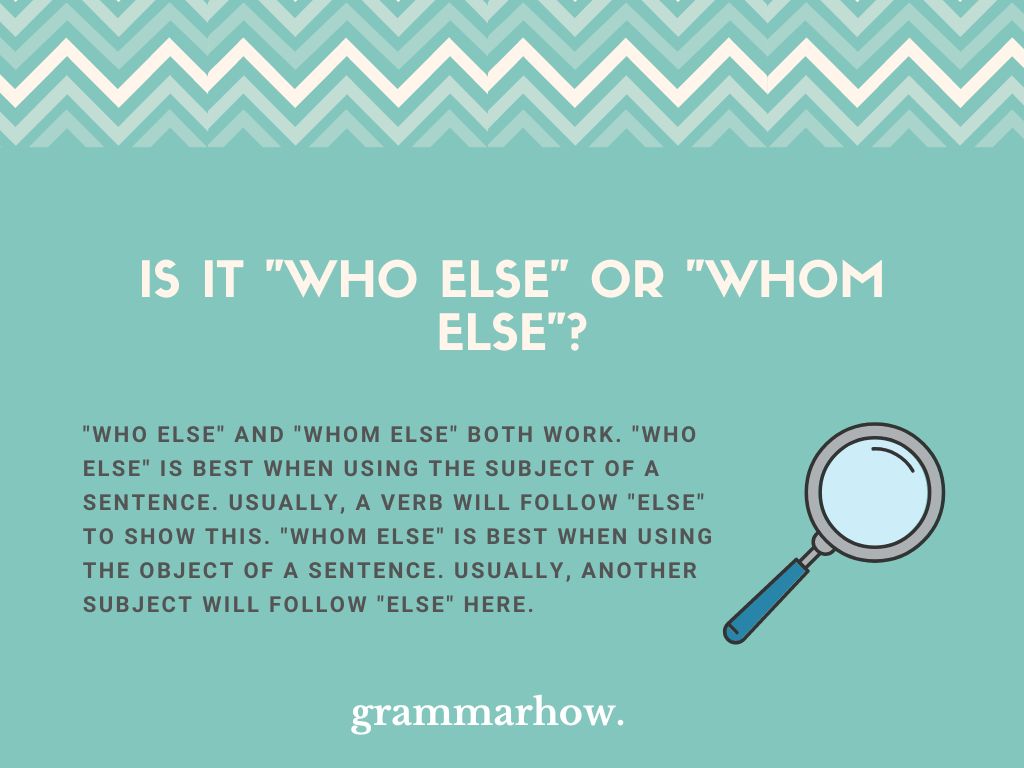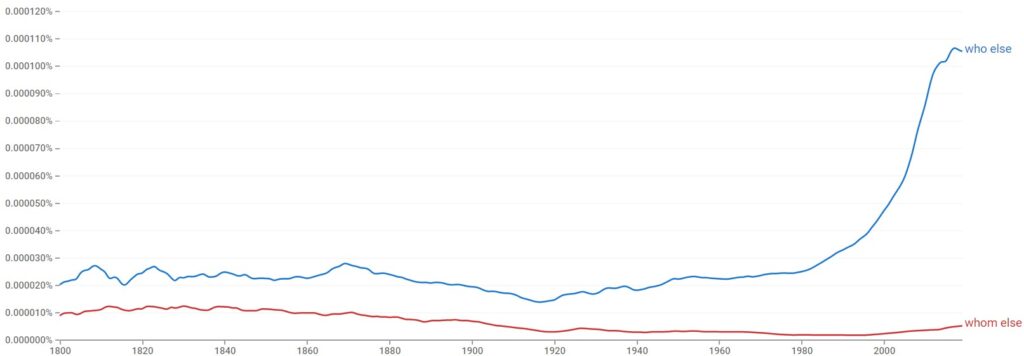You can use “who else” and “whom else” in very similar situations. There are a few differences that we need to cover, and this article will explain all there is to know about the two different forms.
Is It “Who Else” or “Whom Else”?
“Who else” and “whom else” both work. “Who else” is best when using the subject of a sentence. Usually, a verb will follow “else” to show this. “Whom else” is best when using the object of a sentence. Usually, another subject will follow “else” here.

The subject is simple, as only a verb needs to follow “else:”
- Who else is
The object is a bit more difficult, as a new subject needs to be created to get “whom” to work:
- Whom else he told
As long as you stick to these rules, you’ll get them correct. However, the phrases are also interchangeable in many cases.
As English evolves, native speakers are getting more familiar with words like “who,” which also results in old-fashioned words like “whom” taking a backseat.
Nowadays, “whom else” would only ever be used in formal situations where grammar rules are expected to be followed. In any other case, “who else” works best because “who” can work as both a subject and an object informally.
According to Google Ngram Viewer, “who else” is by far the most popular choice of the two. While they are both correct, it’s clear that native speakers value “who” as the correct word over “whom.”

Who Else
“Who else” is correct in most cases, especially when using “who” as the subject of the sentence. You might find that “who” is also synonymous with “whom” (becoming the object of the sentence).
Most native speakers prefer “who” over “whom” in their writing and speaking because it’s less old-fashioned and easier to understand.
- Wait, who else is supposed to be coming again? I want to make sure I have everyone accounted for before moving on.
- Who else is coming? I thought we had everyone here already! I guess I was wrong about that.
- Who else agrees with him? I need to check on the numbers to see whether he won the debate or not.
- Who else said something important? I didn’t think anybody else here had something to say about this!
Whom Else
“Whom else” is correct, but it’s used far less often than “who else.” It only works when you’re using “whom” as the object of the sentence. This only applies if a new subject is added after “else” (i.e. a subject pronoun comes after it).
Even in most formal situations, “whom” is being forgotten about. It’s best to leave this one out of your vocabulary for most situations. Just stick with “who else” when you can.
- Can you tell me whom else he confided in? I think it’s important that we are all on the same page with this thing.
- And whom else she told is of no concern to you. I’m sorry, but I really don’t see why I need to say anything else about this matter.
- I don’t know whom else the people wanted to hear from. I thought we got all the best speakers in for this event.
- I thought I told you whom else they wanted! Why didn’t you listen to me when I gave you the better options?
Which Else
“Which else” is a bit more general than “who” or “whom.” “Which” is a great pronoun that works to talk about objects and items rather than people. “Who” and “whom” are only used for people, so “which else” is best when talking about other things.
- I’m unsure which else was supposed to be used. I thought we had all the equipment at the ready.
- Which else do you think is going to work? I know I can trust your judgment on this better than most people.
- I will find out which else he mentioned from the list we provided. Hopefully, that’ll give us a better idea about his mind.
- Which else did you want again? I know you gave me a few things, but I forgot to check them out.
Final Thoughts
“Who else” and “whom else” both work, but they work for different reasons. For the most part, “who else” should be used. Since native speakers value it more than “whom else,” you should stick to using it if you’re ever stumped. “Whom else” only works in very formal situations.
You may also like:
“People Who” or “People Whom”? Correct Version (+Examples)
“Who Are You Staying With” or “Whom Are You Staying With”?
“Whom Should I Reach Out To” or “Who Should I Reach Out To”?

Martin holds a Master’s degree in Finance and International Business. He has six years of experience in professional communication with clients, executives, and colleagues. Furthermore, he has teaching experience from Aarhus University. Martin has been featured as an expert in communication and teaching on Forbes and Shopify. Read more about Martin here.
